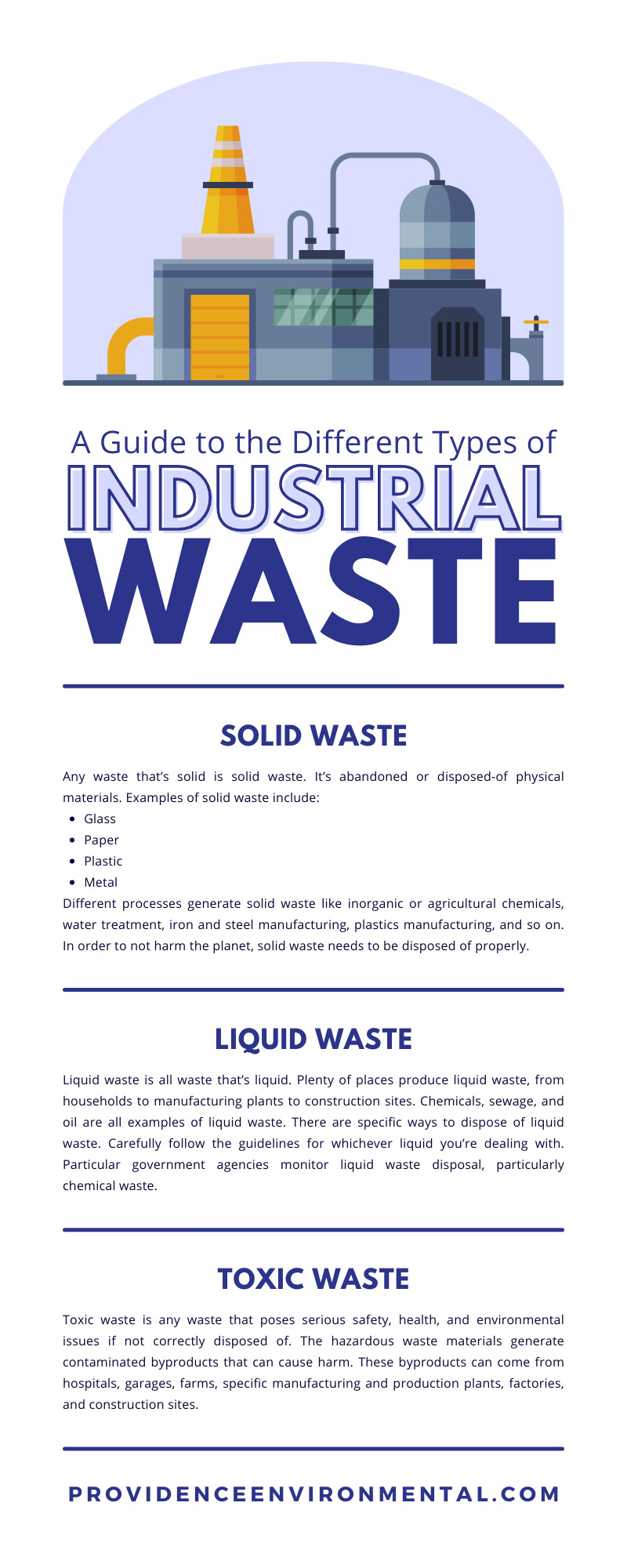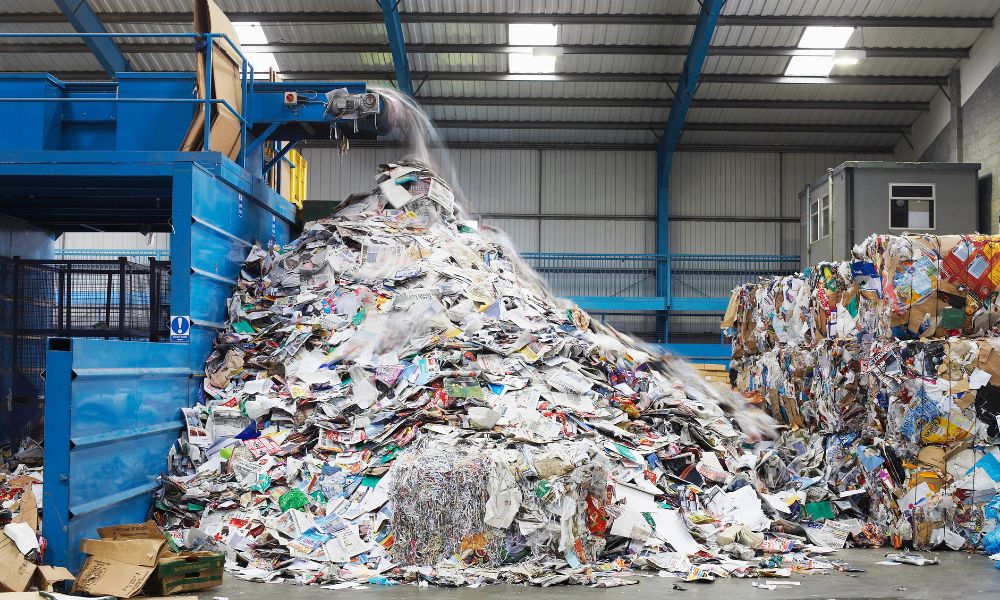Industrial waste is comprised of unwanted or residual waste produced by industrial operations and processes. There are various types of industrial waste, some hazardous and some non-hazardous. Either can be detrimental to people and the environment if not properly handled.
It’s crucial for your business to follow the strict guidelines put into place to help provide protection. You should prepare and educate yourself and your staff on properly handling industrial waste. If you don’t follow them, you could end up with an avoidable fine or penalties. It could also damage your reputation. This guide will help you understand the different types of industrial waste and ways you can reduce the amount of produced industrial waste. We’ll also cover the best ways to dispose of industrial waste.
Solid Waste
Any waste that’s solid is solid waste. It’s abandoned or disposed-of physical materials. Examples of solid waste include:
- Glass
- Paper
- Plastic
- Metal
Different processes generate solid waste like inorganic or agricultural chemicals, water treatment, iron and steel manufacturing, plastics manufacturing, and so on. In order to not harm the planet, solid waste needs to be disposed of properly.
Liquid Waste
As the name implies, liquid waste is all waste that’s liquid. Plenty of places produce liquid waste, from households to manufacturing plants to construction sites. Chemicals, sewage, and oil are all examples of liquid waste. There are specific ways to dispose of liquid waste. Carefully follow the guidelines for whichever liquid you’re dealing with.
Particular government agencies monitor liquid waste disposal, particularly chemical waste. These agencies include Occupational Safety and Health Organization, OSHA, and the Environmental Protection Agency, or the EPA. You could end up with fines for not complying with the guidelines.
Toxic Waste
Toxic waste is any waste that poses serious safety, health, and environmental issues if not correctly disposed of. The hazardous waste materials generate contaminated byproducts that can cause harm. These byproducts can come from hospitals, garages, farms, specific manufacturing and production plants, factories, and construction sites.
The EPA is strict regarding how you can dispose of toxic waste; in fact, that’s why companies like Providence Environmental exist. We provide hazardous waste disposal in South Carolina. We ensure proper disposal and can set up recurring visits, so you don’t need to worry about your waste. Providence Environmental understands there are specific places to take the hazardous and toxic waste.
Is Industrial Waste Recyclable?
Yes, there are certain industrial wastes that you can recycle. There is a significant emphasis on recycling to help our environment and planet. Let’s explore which of the above types of industrial waste are recyclable.
Toxic Waste
Unfortunately, no type of toxic or hazardous waste is recyclable. These pesticides and chemicals need to go to a hazardous waste facility for proper disposal.
Solid Waste
You can recycle many types of solid waste. These items include plastic, glass, metal, and paper. You should focus on recycling as many waste products as possible. Recycling solid waste helps reduce the number of items sent to landfills. Ensure you clean out the products before tossing them into the recycling bin. Clean out the things to remove any traces of food, or you could contaminate the items.
Liquid Waste
Liquid waste is trickier to recycle. The liquid cannot contain any pesticides or chemicals because these hazardous materials harm the liquid deeming it unrecyclable. On the contrary, oil and sewage liquid waste is recyclable. A specific treatment plant separates the oil or wastewater and can sell off the remaining crude oil and inject the wastewater into a deep or saltwater well.
Ways To Reduce Your Industrial Waste
We’ve got you covered if you’re looking for ways to reduce your industrial waste. Reducing our waste is a common goal among many individuals and businesses. There are ways to help decrease the amount of waste your company or household is outputting.
Compost
Creating a compost pile is an excellent way to get the most out of your food or organic waste. This idea is perfect for restaurants and other commercial kitchens looking for ways to reuse their food scraps. You can add yard waste to the compost pile, such as dead flowers, leaves, and grass clippings. It’s a free way to help add nourishment to the soil while keeping waste from the landfill.
You can add certain types of cooking oil to the compost pile. The oil must be vegetable-based, so sunflower oil, corn oil, olive oil, or grapeseed oil. Only dump small amounts into the compost at a time to avoid rotting food. You can also throw in any oil-soaked paper towels. The only exception is if you fried meat in your oil; in that case, throw those paper towels into the garbage. You’ll have happy earthworms on your hands for the delicious cooking oil.
Reduce
A way to significantly impact the amount of industrial waste you produce is to reduce it. Repair broken or damaged items as opposed to tossing them into the garbage, purchasing items in bulk, and buying recycled products. Pay attention to what and how much you’re buying.
Reuse
Want an excellent and easy way to reduce your industrial waste? Learn how to reuse items. Use your coffee grounds as fertilizer for your plants or garden. Swap out napkins for paper towels. They’re significantly larger and sturdier, so you’ll use fewer.
Recycling
Recycling glass, paper, plastic, and metal is an excellent alternative to sending items to landfills. Many businesses understand the importance of recycling and have taken the guessing game out of the task. Bottles and containers will have the recycling symbol posted. It makes recycling easier than ever.
You can also find many products made from recycled materials. Manufacturers are making paper plates, plastic bottles, and more from other recycled products.
Improperly-Disposed-of Industrial Waste
You could end up with penalties or fines if you don’t dispose of your industrial waste properly. You could also be harming people and the environment. Contact your local waste removal company to help properly dispose of the industrial waste. Companies like Providence Environmental provide experience and knowledge of the industry to help you avoid fines and penalties.
How you dispose of it depends on which type of industrial waste you have. Review the above guide to help you determine the best disposal method for your industrial waste. Providence Environmental will work with you to create a customized waste management plan perfect for your business. Contact us today to find out more.


